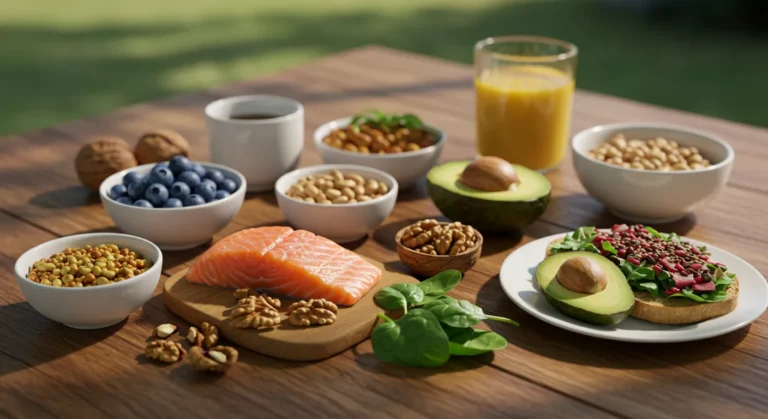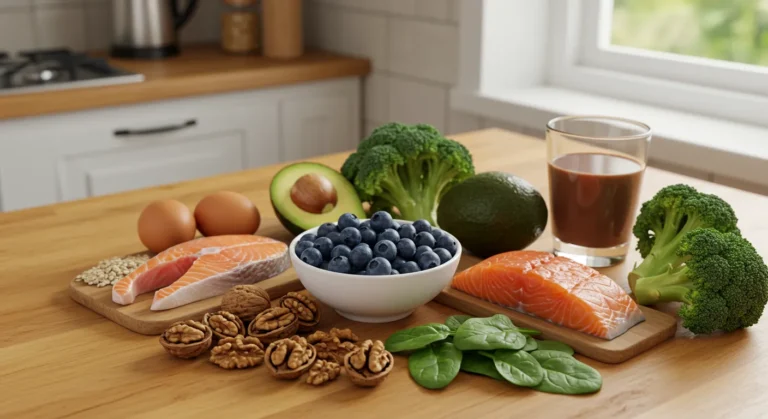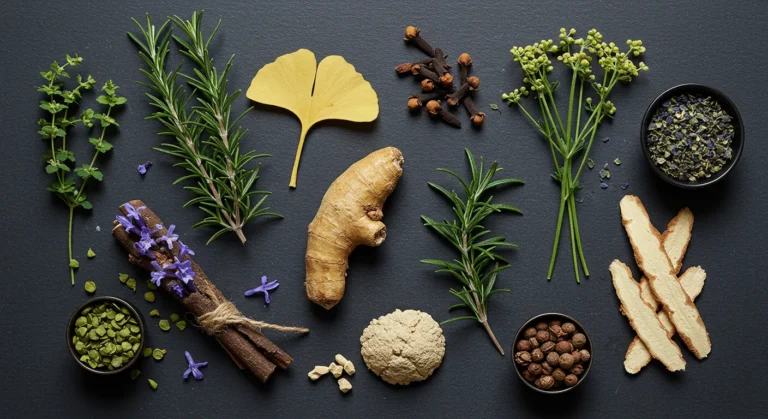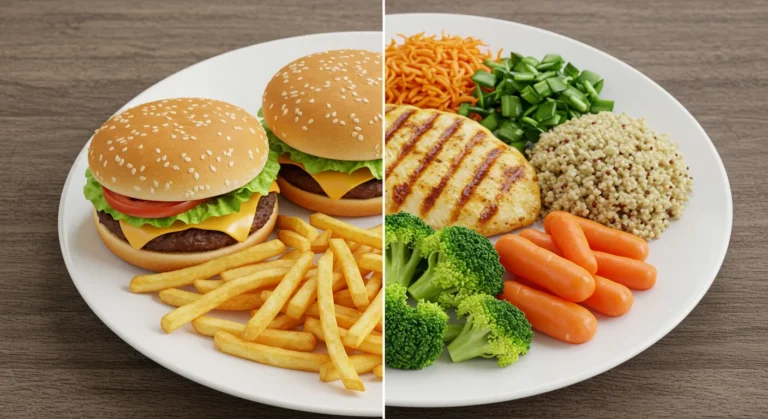Gut-Brain Connection: How Your Microbiome Affects Your Mind

Three months ago, I was dealing with what felt like chronic brain fog. You know that feeling – like thinking through molasses, where even simple decisions feel overwhelming. I’d tried everything: more coffee, better sleep schedules, productivity apps. Nothing stuck.
Then Giulia (who’s way smarter about this stuff than me) asked a question that changed everything: “How’s your digestion been lately?”
Turns out, my gut had been trying to tell my brain something important. And once I started listening, everything shifted.
Here’s what I learned about the gut-brain connection – and why it might be the missing piece in your wellness puzzle too.
Your Gut: The Second Brain You Never Knew You Had
Picture this: you have about 500 million neurons in your gut. That’s more than in your spinal cord. These neurons form what scientists call the “enteric nervous system” – essentially, your gut’s own independent brain.
But here’s where it gets really wild. Your gut produces about 90% of your body’s serotonin – that’s the “happiness neurotransmitter” everyone talks about. So when you’re feeling anxious or down, the problem might not be in your head at all.
The gut brain axis is like a superhighway of communication running between your belly and your brain. This gut-brain connection involves:
- The vagus nerve (your body’s longest cranial nerve, acting like a direct phone line)
- Neurotransmitters (chemical messengers that influence mood and cognition)
- Hormones (including stress hormones that can throw everything off balance)
- Immune system signals (because 70% of your immune system lives in your gut)
When this system works smoothly, you feel clear, balanced, and resilient. When it doesn’t? Hello brain fog, anxiety, and that “off” feeling you can’t quite shake.
The Microbiome Players
Your gut hosts trillions of microorganisms – bacteria, fungi, viruses – that collectively weigh about as much as your brain. These tiny tenants aren’t just along for the ride; they’re actively manufacturing neurotransmitters, influencing inflammation, and even affecting your food cravings.
Some of these microbes are your allies (think Lactobacillus and Bifidobacterium), while others can cause trouble when they overgrow. The key is balance – what scientists call a healthy gut-brain connection diet.
How Food Becomes Mood: The Gut-Brain Connection Diet Breakdown
Every bite you take is a vote for the kind of mental state you want to experience. Sound dramatic? It’s actually just biochemistry.
When you eat processed foods high in sugar and unhealthy fats, you’re feeding the “bad” bacteria that produce inflammatory compounds. These compounds travel up that gut-brain highway and can trigger brain fog, anxiety, and mood swings.
But when you nourish your gut with the right foods, you’re cultivating bacteria that produce beneficial compounds like:
- GABA (your brain’s natural chill pill)
- Serotonin (mood stabilizer and happiness booster)
- BDNF (brain-derived neurotrophic factor – like fertilizer for your neurons)
The Mind Gut Connection Food Arsenal
Fermented Foods: Your Probiotic Powerhouses
- Kefir and yogurt (choose unsweetened, full-fat versions)
- Sauerkraut and kimchi (the tangier, the better for your bacteria)
- Miso and tempeh (umami-rich options that also provide plant protein)
These foods introduce beneficial bacteria directly to your system. Think of them as reinforcements for your gut’s good guys.
Prebiotic Fiber: Feeding Your Microbial Garden
- Garlic and onions (don’t skip the tears – they’re worth it)
- Asparagus and artichokes (spring vegetables that feed beneficial bacteria)
- Bananas and apples (especially when slightly under-ripe)
- Oats and barley (complex carbs that your microbes love)
Prebiotics are like fertilizer for your beneficial bacteria. Without them, even the best probiotics struggle to thrive.
Omega-3 Rich Foods: Brain-Gut Inflammation Fighters
- Wild-caught salmon (aim for 2-3 servings per week)
- Sardines and anchovies (small fish, big omega-3 punch)
- Walnuts and flaxseeds (plant-based options for variety)
- Chia seeds (great in smoothies or overnight oats)
Omega-3s reduce inflammation throughout the gut-brain axis, supporting clearer thinking and stable moods.
Polyphenol-Rich Superfoods: Antioxidant Protection
- Blueberries and blackberries (nature’s brain candy)
- Dark chocolate (70% cacao or higher – doctor’s orders)
- Green tea (L-theanine + antioxidants = calm focus)
- Olive oil (extra virgin, cold-pressed for maximum benefits)
These compounds protect both your gut lining and brain cells from oxidative stress.
The Gut-Brain Disruptors to Minimize
Ultra-Processed Foods These contain additives and preservatives that can damage your gut lining and promote harmful bacterial overgrowth. Your microbiome thrives on variety and real food, not laboratory creations.
Excessive Sugar Sugar feeds pathogenic bacteria and yeasts, creating an imbalanced microbiome. This doesn’t mean you can never enjoy dessert – just be mindful of added sugars in packaged foods.
Artificial Sweeteners Ironically, some zero-calorie sweeteners can actually disrupt your gut bacteria more than regular sugar. Stevia and monk fruit tend to be gentler options.
Strategic Supplements for the Gut Brain Axis
While food should be your foundation, targeted supplements can accelerate your progress. Here’s what actually works:
Probiotics: Choose Wisely Not all probiotics are created equal. Look for:
- Multi-strain formulas with at least 10 billion CFUs
- Lactobacillus helveticus R0052 (clinically studied for mood support)
- Bifidobacterium longum 1714 (shown to reduce stress and improve memory)
Take them consistently for at least 8 weeks to see real benefits.
L-Glutamine: Gut Lining Repair This amino acid helps heal and seal your intestinal barrier. A compromised gut lining (often called “leaky gut”) can allow inflammatory compounds to reach your brain. Typical dose: 5-10 grams daily on an empty stomach.
Lion’s Mane Mushroom: Cognitive Enhancement This functional mushroom stimulates production of nerve growth factor (NGF), supporting both gut nerve health and cognitive function. Look for standardized extracts with at least 30% beta-glucans.
Digestive Enzymes: Absorption Optimization If you’re dealing with bloating or incomplete digestion, enzymes can help you actually absorb the nutrients from your healthy foods. Take them with larger meals.
Omega-3s: Insurance Policy Even with a great diet, it’s hard to get therapeutic levels of EPA and DHA from food alone. Look for molecular distilled fish oil with at least 1000mg combined EPA/DHA daily.
Lifestyle Factors That Support the Gut-Brain Connection
Stress Management: The Game Changer – Chronic stress literally changes your gut bacteria composition, favoring inflammatory species. Find what works for you:
- Deep breathing exercises (even 5 minutes can shift your nervous system)
- Regular movement (walking, yoga, resistance training – all support gut health)
- Quality sleep (your gut bacteria have circadian rhythms too)
Intermittent Fasting: Gut Rest and Reset – Giving your digestive system regular breaks allows beneficial bacteria to flourish and your gut lining to repair. Start with a 12-hour overnight fast and see how you feel.
Mindful Eating: Digestion Optimization Eating – in a rushed, stressed state impairs digestion and nutrient absorption. Try to eat at least one meal per day without distractions – your gut will thank you.
Real-World Implementation: Making It Stick
Start with one change this week. Maybe it’s adding a small serving of sauerkraut to your lunch, or swapping your afternoon snack for Greek yogurt with berries.
Pay attention to how you feel – not just physically, but mentally and emotionally. Your gut-brain connection will give you feedback if you listen.
Remember, this isn’t about perfection. It’s about consistently making choices that support the communication between your gut and brain. Some days you’ll nail it, others you won’t. That’s human.
The goal is progress, not perfection. Your microbiome is remarkably resilient and responsive to positive changes.
The Bottom Line
Your gut brain connection isn’t just wellness trendy talk – it’s fundamental biology. The trillions of microbes in your digestive system are actively influencing your thoughts, moods, and mental clarity every single day.
By understanding this gut-brain connection and making strategic food and lifestyle choices, you’re not just improving digestion – you’re optimizing your entire nervous system.
The best part? You don’t need expensive tests or complicated protocols. Start with real food, manage your stress, and listen to your body. Your gut has been trying to help your brain all along – now you know how to let it.
Ready to dive deeper into science-backed wellness strategies? Check out our guides on brain food recipes and stress management techniques that actually work.
Disclaimer: The information provided is for educational purposes only, not a substitute for professional medical advice. Always consult a healthcare professional.




